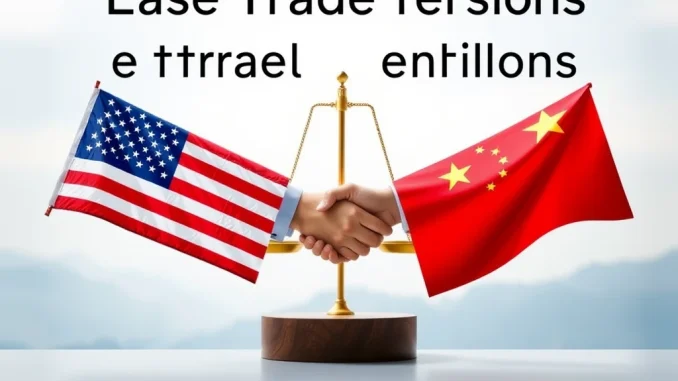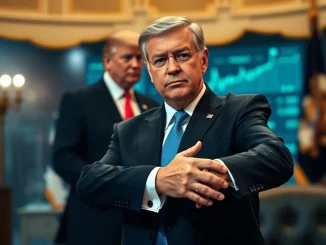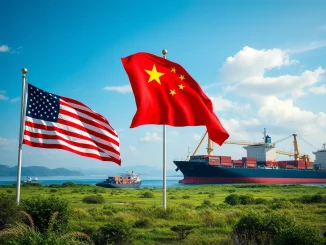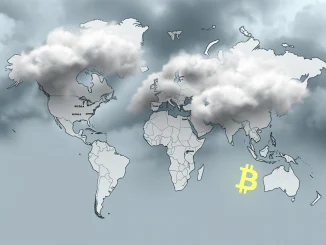
In a surprising turn of events that could signal a significant shift in global trade dynamics, former U.S. President Donald Trump has hinted at a possible de-escalation in the ongoing tariff confrontation with China. Speaking to reporters at the White House, Trump indicated he’s considering dialing back the Trump Tariffs, acknowledging the potential harm of escalating costs on American consumers. This news arrives as the global economy grapples with inflation and supply chain disruptions, making the timing particularly noteworthy for markets, including the volatile cryptocurrency space.
Could Easing Trump Tariffs Cool Down Inflation?
For years, the Trump Tariffs imposed on Chinese goods have been a contentious issue, forming a cornerstone of his ‘America First’ trade policy. The initial intent was to protect American industries and reduce the trade deficit. However, the impact has been multifaceted and debated:
- Increased Costs for Businesses: American companies importing goods from China faced higher costs due to tariffs, which often translated to increased prices for consumers.
- Retaliatory Tariffs: China responded with its own tariffs on American goods, impacting U.S. exporters, particularly in agriculture.
- Supply Chain Disruptions: The Trade War contributed to uncertainty and disruptions in global supply chains, prompting businesses to rethink their sourcing strategies.
- Consumer Impact: Ultimately, a portion of the tariff burden is often passed on to consumers through higher prices for everyday goods.
Trump’s recent statement suggests a potential pivot. “I don’t want them to go higher because at a certain point you make it where people don’t buy,” he stated, according to Reuters. This admission directly acknowledges the concern that escalating tariffs can dampen Consumer Demand by making goods more expensive. He even suggested the possibility of lowering existing tariffs, indicating a significant shift in his stance.
What Does This Mean for the China Trade Relationship?
The relationship between the U.S. and China has been strained for years, with trade being a major point of contention. The Trade War initiated during Trump’s presidency has had far-reaching consequences, impacting not only the two nations directly involved but also the broader Global Economy. A move to ease tariffs could signal:
- Reduced Trade Tensions: Lowering tariffs could be interpreted as a goodwill gesture, potentially paving the way for smoother trade negotiations and a less confrontational relationship.
- Boost to Global Trade: Reduced tariffs can stimulate trade flows between the two largest economies, benefiting businesses and consumers worldwide.
- Market Optimism: Easing trade tensions often leads to increased investor confidence and positive market sentiment, potentially impacting various asset classes, including cryptocurrencies.
- Focus on Other Issues: A de-escalation in the Trade War might allow both countries to focus on other pressing global issues, such as climate change, geopolitical stability, and technological cooperation.
Impact on Consumer Demand and the Broader Economy
Trump’s concern about Consumer Demand is central to understanding the potential implications of tariff adjustments. High inflation rates across the globe are already squeezing household budgets. Tariffs, acting as an additional tax on imported goods, can exacerbate this pressure. Lowering tariffs could provide some relief by:
- Reducing Import Costs: Lower tariffs directly reduce the cost of imported goods for businesses.
- Lowering Consumer Prices: Ideally, reduced import costs are passed on to consumers in the form of lower prices, boosting purchasing power.
- Stimulating Economic Activity: Increased Consumer Demand can lead to higher production, job creation, and overall economic growth.
- Easing Inflationary Pressures: By reducing import costs and potentially lowering consumer prices, easing tariffs could contribute to moderating inflation.
Cryptocurrency Markets and Global Economic Sentiment
While not directly related to cryptocurrency, global economic events and sentiment significantly influence the crypto market. Positive news regarding the Global Economy, such as easing trade tensions and potential inflation moderation, can contribute to a more favorable risk-on environment. In such environments, investors are often more willing to allocate capital to riskier assets like cryptocurrencies.
Conversely, escalating trade wars and economic uncertainty tend to foster risk-off sentiment, potentially leading investors to seek safer havens and reduce exposure to volatile assets like crypto. Therefore, Trump’s hint at easing Trump Tariffs, if it materializes, could be viewed as a positive signal for the broader market, indirectly supporting a more optimistic outlook for cryptocurrencies.
Looking Ahead: Will China Trade Relations Thaw?
It remains to be seen whether Trump’s comments will translate into concrete policy changes. However, the mere suggestion of easing tariffs is a noteworthy development. It indicates a potential shift in perspective regarding the effectiveness and consequences of the Trade War. The future of China Trade relations and the trajectory of Trump Tariffs will be closely watched by businesses, consumers, and investors worldwide, including those in the cryptocurrency space.
Conclusion: A Potential Turning Point?
Donald Trump’s indication that he doesn’t want to increase tariffs and might even lower them offers a glimmer of hope for easing global trade tensions. While the actual impact remains to unfold, this shift in rhetoric suggests a potential turning point in the Trade War with China. If tariffs are indeed eased, it could provide a welcome boost to Consumer Demand, offer some relief from inflationary pressures, and contribute to a more positive global economic outlook, potentially benefiting various markets, including the dynamic world of cryptocurrencies. The markets will be keenly observing if this hint transforms into tangible action, marking a new chapter in international trade relations.



